Rehabilitation is a key strategy for the COVID-19 pandemic, with respect to this Physiopedia has released 5 new FREE courses related to rehabilitation and COVID-19.
A longitudinal study published in mid-July suggests that re-infection of coronavirus is probable which means the virus is here to stay. This has wide reaching implications on health service provision as we will not only have to combat the virus now but likely seasonally too. We will have post-covid survivors for the foreseeable future and they are going to have unique needs when it comes to regaining physical strength and function. Our profession is going to be key to enabling rehabilitation through the different phases of the disease so it is our duty to ensure we are all up to date and ready to help the global need wherever our local community is.
Physioplus is committed to this cause too and that’s why we’ve made all 13 of our COVID-19 courses available for free through a trial account. This includes the latests 5 course programme focussing on rehabilitation and the courses aim to provide an overview of rehabilitation in different settings, and population groups and to empower us to be able to manage the patient in the post-acute phase and in the community during this pandemic.
We would like to add a special shout out to World Physiotherapy for their generously support through our COVID-19 response.
The New Courses
COVID-19 Post-Acute Rehabilitation

People with severe COVID-19 infection have rehabilitation needs in the acute, post-acute and long-term phases of the disease. Many people who have suffered from COVID-19 may now be at risk of long-term impairment or disability. Physiotherapists are critical to the rehabilitation efforts in all phases of this disease. Rehabilitation has a positive effect on health and functioning outcomes, it improves recovery and can reduce disability, it may facilitate early discharge and reduce the risk of readmission. Physiotherapists also play a key role in supporting and empowering people through rehabilitation process.
Rehabilitation is Key to Long Term Recovery
COVID-19 and Community Rehabilitation
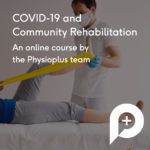
An increase in the rehabilitation needs of COVID-19 patients following their discharge from the hospital is to be expected during the pandemic. Rehabilitation services in local communities are often the best-placed to provide rehabilitation and long-term care. Community-based physiotherapists will be key in the ongoing rehabilitation of survivors of COVID-19 to optimise the recovery of these patients.
What’s Our Role in The Community?
COVID-19 Rehabilitation in Vulnerable Populations
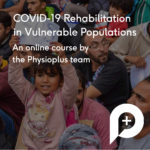
COVID-19 poses a severe threat to all communities, but refugees, people who are displaced and those living in low-income areas will face even greater challenges. This course will introduce the issues faced by refugees/displaced people in camps and camp-like settings as well as explore various options that may help to reduce the transmission of COVID-19 in high-risk individuals in these settings.
Vulnerable Populations Face Even Greater Challenges
The Importance of Continuing Rehab Provision During COVID-19
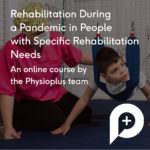
It is critical that rehabilitation continues in people with specific rehabilitation needs, even during a pandemic. The COVID-19 pandemic has caused countries to implement strict infection control measures such as social distancing and restricting people’s regular movement. A lack of access to rehabilitation could have serious implications on the health outcomes of people with specific ongoing rehabilitation needs. Physiotherapists need to make difficult decisions relating to the continuation of rehabilitation services during the COVID-19 outbreak. Changes in rehabilitation services due to pandemic constraints will have significant implications for today and the future.
Rehab Must Continue Throughout The Pandemic
Innovative Approaches in Providing Rehab During COVID-19
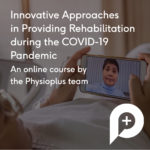
COVID-19 is currently placing significant pressure on health services around the world. A significant number of patients who become infected with COVID-19 will become severely unwell and require hospital-level care. Their ongoing rehabilitation requirements will often be high. However, due to the pandemic, rehabilitation professionals are unable to provide their usual services to both COVID-19 and non-COVID-19 patients. This course explores innovative approaches that rehabilitation professionals can adopt to ensure that they are able to continue providing essential rehabilitation services during the COVID-19 pandemic.
It’s Time for Innovation
The COVID-19 Course Collection
COVID-19 and Nutrition

Nutrition is not a cure for COVID-19, but it is a modifiable contributor to the development of chronic disease, which is associated with COVID-19 severe illness and deaths. A well-balanced diet strengthens the immune system and reduces the risk of chronic disease and infectious diseases. Every physiotherapist should be aware of the benefits of healthy eating and be able to provide sound nutritional guidance to their patients, especially those with chronic disease.
Join This Course Now to Optimise Nutrition for Your Patients
COVID-19 and Physical Activity
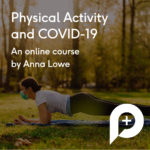
The COVID-19 pandemic is an unprecedented time all across the world. Extensive social distancing policies have been applied, restricting people’s daily activities across the globe. These social distancing and lockdown measures mean that people have far fewer opportunities to be physically active. Although these extreme measures are important and needed in a time such as now, our bodies and minds still need physical activity and the many related benefits. This course focuses on the importance of physical activity even under lockdown and the implications of physical inactivity during lockdown periods. It also highlights the role of physical activity as part of physiotherapy interventions during COVID-19.
Physical Activity is as Important as Ever
Mental Health During the COVID Pandemic
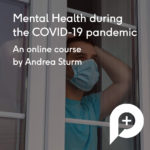
The global outbreak of the novel Corona virus touches everyone – patients, health care professionals, and the public in general. One important aspect of human wellbeing is mental health which is likely to be overlooked in the pandemic response. In this course, we learn about how the mental health of patients and healthcare professionals could be affected and introduce relevant management strategies.
Help Both Your Own and Your Patients Mental Health Now
COVID-19 and Sleep

Fatigue, sleep deprivation and stress are common in healthcare professionals especially during the COVID-19 pandemic. Sleep and the body’s immune system are inextricably linked. Sleep deprivation potentially impairs the body’s immune response, negatively affects inflammatory homeostasis and may also lead to an increased risk of infection and worsen the clinical conditions caused by a disease such as COVID-19. It is imperative to address sleep health for the sake of healthcare professionals and their patients particularly during the stresses imposed during a pandemic.
Sleep is Essential to Recovery
Understanding COVID-19
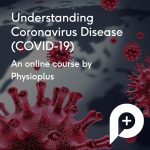
Coronaviruses are a family of viruses that cause illnesses such as respiratory or gastrointestinal diseases. In January 2020 a previously unknown coronavirus was identified in Wuhan China. The group of conditions related with infection by this new virus was named Coronavirus Disease 2019 (COVID-19) by the World Health Organisation (WHO). Following its rapid spread around the globe, the WHO has declared the COVID-19 a pandemic. It mainly presents with respiratory symptoms, fever and can result in severe acute respiratory distress in high-risk populations.
Understanding Coronavirus
Infection Prevention and Control
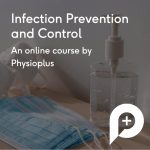
Procedures and techniques for infection prevention and control are essential for good community health, to limit healthcare-acquired infections as well as control the general spread of epidemics and pandemics. A key component of this is basic hand hygiene which forms the foundation of infection control. The use of personal protective equipment (PPE) such as gloves, masks, gowns and goggles allows healthcare personal to treat patients with communicable diseases while protecting themselves and others. The procedures for putting on (donning) and taking off (doffing) of PPE needs to follow specific sequencing and techniques in order to ensure best infection control and prevention practices.
The Best Practice to Limit Spread
Role of Physiotherapy in COVID-19
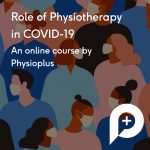
The Coronavirus Disease 2019 (COVID-19) has led to a global pandemic affecting a large proportion of the countries of the world. As front line practitioners, it is likely that physiotherapists and physical therapists will come into direct contact with patients that are infected by this virus. It is therefore essential that they understand the many aspects of their role in identifying, containing, mitigating and treating the symptoms of this disease. This includes implementing methods to reduce the transmission of COVID-19, initiating early identification strategies, and dealing with identified cases appropriately in the clinic and home environments. Note: a detailed review of the physiotherapy respiratory care of these patients will be addressed in a subsequent course.
Physiotherapy and COVID-19 Management
Respiratory Management of COVID-19
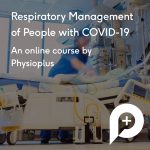
Approximately 15% of individuals with COVID-19 develop moderate to severe disease and require hospitalisation and oxygen support, with a further 5% who require admission to an Intensive Care Unit and supportive therapies including intubation and ventilation. The most common complication in severe COVID-19 patients is severe pneumonia, but other complications may include Acute Respiratory Distress Syndrome (ARDS), Sepsis and Septic Shock, Multiple Organ Failure, including Acute Kidney Injury and Cardiac Injury. Physiotherapists need to understand their role in the management of patients with COVID-19 in the acute hospital setting and also in the rehabilitation following recovery from the disease.
Respiratory Management of COVID-19








 Fatigue, sleep deprivation and stress are common in healthcare professionals especially during the COVID-19 pandemic. Sleep and the body’s immune system are inextricably linked. Sleep deprivation potentially impairs the body’s immune response, negatively affects inflammatory homeostasis and may also lead to an increased risk of infection and worsen the clinical conditions caused by a disease such as COVID-19. It is imperative to address sleep health for the sake of healthcare professionals and their patients particularly during the stresses imposed during a pandemic.
Fatigue, sleep deprivation and stress are common in healthcare professionals especially during the COVID-19 pandemic. Sleep and the body’s immune system are inextricably linked. Sleep deprivation potentially impairs the body’s immune response, negatively affects inflammatory homeostasis and may also lead to an increased risk of infection and worsen the clinical conditions caused by a disease such as COVID-19. It is imperative to address sleep health for the sake of healthcare professionals and their patients particularly during the stresses imposed during a pandemic.



